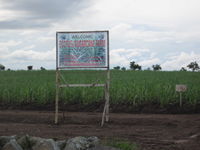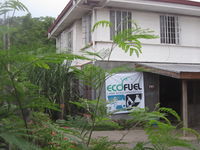ECOFUEL Land Development, Inc.
ECOFUEL Land Development, Inc. is a Philippines-based development company that has a contract with Green Future Innovations Inc. (GFII) to develop an 11,000 hectare (27,000 acre) sugarcane plantation in the Philippine province Isabela. The sugarcane will be used as a feedstock for GFII's bioethanol plant, located in San Mariano municipality, Isabela province. Company officials have said that the plant will not be viable unless ECOFUEL succeeds in developing at least 8000 hectares (20,000 acres) of sugarcane within 40 km of the plant.[1] The project is strongly opposed by residents of San Mariano and the surrounding areas.
Contents
Sugarcane Plantation for the San Mariano Bioethanol Project
ECOFUEL Plantation Possibly Violates Filipino Law
Filipino law, as set out in Joint Administrative Order no. 2008-1, states:
- "Section 4.1. Criteria for DA Certification. , The following are the criteria for the issuance of DA [Department of Agriculture] certification:[2]
- a. Cereals that can be used both for food and for biofuel production such as, but not limited to, corn and wheat shall not be used for biofuel production;
- b. The land to be used shall be consistent with the natural expansion of the municipality or locality, as contained in the approved physical framework and land use plan by the concerned municipality or locality;
- c. The area that will be used is not the only remaining food production area of the community,
- d. All agricultural areas classified hereunder shall not be utilized for biofuel feedstock production:
- 1. All areas covered by government-funded irrigation facilities, either national agency or LGU, designed to support rice and other crop production, and all irrigated lands where water is not available for rice and other crop production but are within areas programmed for irrigation facility rehabilitation by DA and NIA;
- 2. All irrigable lands already covered by irrigation projects with firm funding commitments as certified by NIA at the time of the application for land use conversion;
- 3. All privately irrigated alluvial plain lands utilized for rice and corn production; and
- 4. All agricultural lands that are ecologically fragile, the utilization of which will result in serious environmental degradation."
In other words, feedstocks for ethanol may not be grown on any irrigable land currently used for food production or on environmentally fragile land. Government officials have confirmed that the law does not allow for shifting of crops on areas used for food (including corn, rice, and sugar) into sugarcane used for bioethanol.[3] However, ECOFUEL has stated that 20 percent of their sugarcane plantation thus far is located on land that was used for corn and cassava prior to planting it in sugarcane.[4]
Contact Information
- ECOFUEL Land Development, Inc.
- 85 Mabini St.
- Cauayan City Isabela 1600.
- Philippines
- Fax: 63-4709573.
Articles and Resources
Related Sourcewatch Articles
- Green Future Innovations Inc.
- Biofuels
- Ethanol
- Sugarcane
- Socialized Industrial Forest Management Agreement (Philippines)
- Community-Based Forest Management (Philippines)
References
- ↑ This was stated in a tour of the plant given to an International Fact Finding Mission on May 31, 2011.
- ↑ JOINT ADMINISTRATIVE ORDER NO. 2008-1, Series of 2008: "Guidelines Governing the Biofuel Feedstocks Production, and Biofuels and Biofuel Blends Production, Distribution and Sale under Republic Act No. 9367."
- ↑ June 6, 2011 meeting between members of an International Fact Finding Mission and Benjamin Juevas of the Department of Agriculture at the Department of Agrarian Reform in Quezon City, Philippines.
- ↑ June 3, 2011 meeting between ECOFUEL, GFII, and members of an International Fact Finding Mission in Cauayan City, Isabella, Philippines.
External Resources
- Bioethanol Project in San Mariano Isabela
- Bioethanol Production from Sugarcane.
- JOINT ADMINISTRATIVE ORDER NO. 2008-1, Series of 2008: "Guidelines Governing the Biofuel Feedstocks Production, and Biofuels and Biofuel Blends Production, Distribution and Sale under Republic Act No. 9367."
External Articles
- Gerry Albert Corpuz, John Lloyd Hoffman and Lala Mudra Flores-Aguilar, Foreign group urges Aquino to recall bio-ethanol project in Isabela, AllVoices, June 5, 2011.
- Cynthia D. Balana, "Int’l group probes alleged land-grab by foreign firms," Philippine Daily Inquirer, June 5th, 2011.
- Donnabelle L. Gatdula, "Green Future Innovations to build P6-billion ethanol plant in Isabela," The Philippine Star, January 31, 2011.
- "Green Future Innovations announces Bioethanol plant in Isabela," Alternat1ve, October 11, 2010.
- "ITOCHU and JGC launch large-scale bio-ethanol production and power plant businesses in the Philippines," press release, ITOCHU Corporation, April 8, 2010.
- Alena Mae S. Flores, "Japan’s Itochu, partners building ethanol facility in Isabela," Manila Standard Today, January 13, 2010.
- Mason Inman, "Clearing Land for Biofuels Makes Global Warming Worse," National Geographic News, February 7, 2008.
- Emma Graham-Harrison, "Biofuels speeding global warming: Chemist pointing at fertilizers used in modern farming," Reuters, October 8, 2007. (The same article is available here.)

